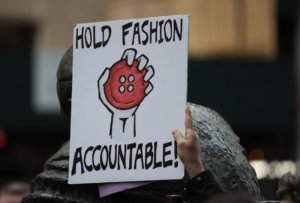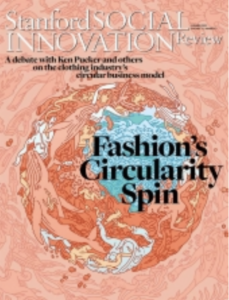
“How would you suggest that I invest my savings of ten thousand dollars to have a positive social and environmental impact?”
The question came from a PhD student this time, but we get it a lot. Many people want their money to work for them—to preserve their financial security and to improve the world. In fact, almost 85 percent of individual investors say they are interested in sustainable investing and more than three quarters believe they can use their investments to influence the extent of climate change. In response, asset managers have created and rebranded trillions of dollars of funds as ESG (environment, social, and governance) funds targeting socially minded investors. So, it should be easy to recommend many worthy qualifying investments. Right?
https://ssir.org/articles/entry/a_realists_guide_to_investing_for_good
 These fervent objections to the longstanding use of environmental, social, and governance (ESG) criteria in investing are a recent political chimera emanating — at least in part — from the overselling of an ill-defined concept. ESG investors include nonfinancial factors in their decisions to buy or sell a security or private asset. ESG does not, however, prevent them or anybody else from purchasing the stocks of fossil fuel companies, nor does it contribute essential primary capital to develop solutions to avoid the worst impacts of climate change.
These fervent objections to the longstanding use of environmental, social, and governance (ESG) criteria in investing are a recent political chimera emanating — at least in part — from the overselling of an ill-defined concept. ESG investors include nonfinancial factors in their decisions to buy or sell a security or private asset. ESG does not, however, prevent them or anybody else from purchasing the stocks of fossil fuel companies, nor does it contribute essential primary capital to develop solutions to avoid the worst impacts of climate change.



 electronics to fashion follow a one-way path of “make, take, and waste.” This linear operating system is straining resources, polluting oceans, and generating mountains of waste. Unrelenting pressure for growth continues to stress biodiversity and accelerate atmospheric warming, thereby increasing the intensity and incidence of drought, flooding, and migration. As a result, the public’s consent to resource-consumptive industries is increasingly at risk.
electronics to fashion follow a one-way path of “make, take, and waste.” This linear operating system is straining resources, polluting oceans, and generating mountains of waste. Unrelenting pressure for growth continues to stress biodiversity and accelerate atmospheric warming, thereby increasing the intensity and incidence of drought, flooding, and migration. As a result, the public’s consent to resource-consumptive industries is increasingly at risk. Vanguard had previously joined the Net Zero Asset Manager’s initiative (NZAM) in 2021, but withdrew 21 months later, citing confusion about individual firms’ views. Vanguard is unique in its ownership structure, commitment to passive index-based low-fee funds, and focus on retail investors. It has taken a more cautious approach to ESG investing and doesn’t heavily rely on external ESG ratings services. Critics argue that Vanguard should compel companies to decarbonize to prevent portfolio losses, but this overlooks asset managers’ primary duty and overstates ESG investing’s impact. Vanguard believes that addressing climate change requires governmental action and that the industry should aggressively endorse this path. Regulatory changes clarifying sustainable investing and a bifurcation of ESG investing can enable more authentic decarbonization. Vanguard’s NZAM withdrawal acknowledges the limits of win-win ESG “solutions” and clarifies the path to urgent decarbonization.
Vanguard had previously joined the Net Zero Asset Manager’s initiative (NZAM) in 2021, but withdrew 21 months later, citing confusion about individual firms’ views. Vanguard is unique in its ownership structure, commitment to passive index-based low-fee funds, and focus on retail investors. It has taken a more cautious approach to ESG investing and doesn’t heavily rely on external ESG ratings services. Critics argue that Vanguard should compel companies to decarbonize to prevent portfolio losses, but this overlooks asset managers’ primary duty and overstates ESG investing’s impact. Vanguard believes that addressing climate change requires governmental action and that the industry should aggressively endorse this path. Regulatory changes clarifying sustainable investing and a bifurcation of ESG investing can enable more authentic decarbonization. Vanguard’s NZAM withdrawal acknowledges the limits of win-win ESG “solutions” and clarifies the path to urgent decarbonization. company. But based on my experience as a former executive who is now an
company. But based on my experience as a former executive who is now an  Most people assume that ESG Investing is designed to reward companies that are helping the planet. In fact, ESG ratings which underlie ESG fund selection are based on “single materiality” — the impact of the changing world on a company P&L, not the reverse. Asset management firms have been happy to let the confusion go uncorrected — ESG funds are highly popular and come with higher management fees. The danger with ESG investing is that it might convince policy makers that the market can solve major societal challenges such as climate change — when in fact only government intervention can help the planet avoid a climate catastrophe
Most people assume that ESG Investing is designed to reward companies that are helping the planet. In fact, ESG ratings which underlie ESG fund selection are based on “single materiality” — the impact of the changing world on a company P&L, not the reverse. Asset management firms have been happy to let the confusion go uncorrected — ESG funds are highly popular and come with higher management fees. The danger with ESG investing is that it might convince policy makers that the market can solve major societal challenges such as climate change — when in fact only government intervention can help the planet avoid a climate catastrophe